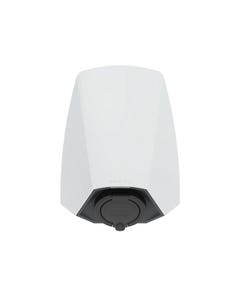OZEV Grant & WCS Guide
You’ll see a lot of mentions of the OZEV grant, and also ULEZ or OZEZ grant when you’re looking for electric car chargers. If you’re unsure what all the acronyms mean, if you need to explain the details to clients, or you simply want to find out what you’re eligible for, and how you can claim, then this guide is for you.
We’ll cover:
- What the OZEV, EVCPG, and WCS are
- How you can apply
- What vehicles are eligible
- What EV chargers are eligible
What is the OZEV Grant?
The UK Government set up the office for Zero Emission Vehicles (OZEV) as part of the DfT, and as part of this, they offer the EV Charge Point Grant and Workplace Charging Scheme (WCS). As of 2021, the Office has been renamed as the Office for Zero Emission Vehicles
The EVCPG and the WCS are fundamentally the same thing in that the government will provide a £350 grant to be used against the cost of an electric vehicle charger, provided that certain criteria are met. The EVCPG applies to individuals and their homes, and the WCS unsurprisingly, is targeted at business and commercial installations. The former especially is often just referred to as the OZEV grant.
Both grants are quite simple to apply for, as long as you fit basic criteria.
If you are looking for information on the EVHS scheme, the government ended this on the 1st April 2022. This has now been replaced by the EV Charge Point Grant.
OZEV Grant Criteria
- You have to buy an OZEV / Plug-In approved EV Charger
- You have to use anOLEV / Plug-In approved installer
- You must have off-street parking
- You must have bought an eligible EV or PHEV, or leased one for a minimum of 6 months.
You can find a list of eligible EVs on the GOV.uk website. But in short, eligible cars need to fall into at least one of these categories:
- Category 1: vehicles have CO2 emissions of less than 50g/km and can travel at least 112km (70 miles) without any emissions at all
- Category 2: vehicles have CO2 emissions of less than 50g/km and can travel at least 16km (10 miles) without any emissions at all
- Category 3: vehicles have CO2 emissions of 50 to 75g/km and can travel at least 32km (20 miles) without any emissions at all.
For private use in someone’s home (the EVHS), the applicant is eligible for up to £350 off the price of the electric car charger. You can apply for a grant per car and charger, up to a limit of 2 cars per household.
For the Workplace Charging Scheme grant, businesses, charities and public sector organisations can claim up to 75% of the costs, capped at £350 per socket, and up to a limit of 40 chargers per organisation. It’s a voucher system designed to provide support for the upfront cost of installation of electric car chargers. In real terms, this equates to a maximum £14,000 of government support. The WCS also stipulates that the organisation has to have private, off-street parking to be eligible.
EV Charge Point Grant
The EV Chargepoint Grant for flat owner-occupiers and people living in rented properties is open to Electric Vehicle drivers who live in a flat or rent a property. The grant will cover up to 75% of the total costs of the purchase and installation of EV chargepoints (inclusive of VAT) and enabling infrastructure for future chargepoints.
The EV chargepoint grant provides funding of up to 75% towards the cost of installing electric vehicle smart chargepoints at domestic properties across the UK. It replaced the Electric Vehicle Homecharge Scheme (EVHS) on 1 April 2022.
For more information on how to apply for a grant, please choose the option below that best suits your needs.


This grant is for entities that rent, lease or manage residential or commercial properties (referred to hereafter as landlords) and want to install EV chargepoints on their properties. You can get funding towards 75% of the total cost of buying and installing an OZEV approved chargepoint, up to a maximum of £350 per socket installed.
You may apply for this grant if you are one of the following:
- landlord of a property that lets the property
- right to manage (RTM) company
- companies owning the freehold of a leased or rented property
- companies owning a building’s common areas. The company may comprise
- shareholders who are the leaseholders. The company may also manage the building
- property factor listed here in the property factor register
- private registered providers of social housing (PRP)
- public authorities, such as government departments and their agencies, the armed forces, local governments, the NHS and emergency services
charities
You must be registered at Companies House. If not, you must be VAT registered with Her Majesty’s Revenue and Customs (HMRC). If you are not registered at either, you will not be eligible for the grant.
In considering eligibility, OZEV will use the public authorities referenced in the Local Government Act 2003, Section 33 and the Freedom of Information Act, Schedule 1, parts 1-3.
Steps to apply for the grant
The grant involves the following steps:
- The landlord must register with DVLA using the EV chargepoint grant for landlords registration form.
- The landlord chooses an OZEV approved installer for the work to be undertaken at an eligible property.
- Once work is complete, the installer applies for the grant on behalf of the landlord. The installer will need tell OZEV what was installed and send evidence to verify this. This will include a copy of the invoice and photos of the chargepoints installed.
- If the grant is awarded, OZEV will pay the grant to your installer, who must pass the discount on to you.
Before you apply for a grant
Before you begin, you should:
- Familiarise yourself with the grant rules and restrictions.
- Discuss your needs with one or more OZEV authorised installer(s)
- Agree what you want installed, checking that the chargepoint you want installed is listed on the OZEV approved chargepoint model list.
- Identify if any upgrades are needed to your electrical supply and arrange with your distributed network operator for this to be done before applying for the grant
- Work out how you will manage the chargepoints once they are installed, including maintenance and electricity costs
- Ensure accessibility needs will be addressed when installing an EV chargepoint, particularly for EV owners who may be disabled or have mobility needs
Grant Rules and Restrictions
You will be referred to as a landlord hereafter if you are one of the above.
You must be registered at Companies House. If not, you must be VAT registered with Her Majesty’s Revenue and Customs (HMRC). If you are not registered at either, you will not be eligible for the grant.
In considering eligibility, OZEV will use the public authorities referenced in the Local Government Act 2003, Section 33 and the Freedom of Information Act, Schedule 1, parts 1-3.
For more information, please visit https://www.gov.uk/government/publications/ev-chargepoint-grant-for-landlords-customer-guidance/ev-chargepoint-grant-for-landlords-customer-guidance
This scheme replaces the Electric Vehicle Homecharge Scheme (EVHS) and is open to:
- homeowners who live in flats
- people in rental accommodation (flats and single-use properties)
This guidance remains largely unchanged from the Electric Vehicle Homecharge Scheme: guidance for customers.
The main changes are that:
- the customer must live in rental accommodation or own a flat
- the installer must confirm ownership of the property. If rented, confirm the name and address of person or entity letting the property as it appears on the rental agreement
- customers will no longer be able to claim for 2 chargepoints if they own a second electric vehicle
EVHS authorised installers will be eligible to claim under this scheme. The installer applies for the grant on behalf of the customer.
The same list of EVHS approved chargepoints and EVHS eligible vehicles applies to this scheme.
Once the digital service goes live, the Office for Zero Emissions (OZEV) will transfer grant applicants over to the digital portal to prevent duplicate applications.
Electric vehicles are a crucial step to decarbonising our transport system and reducing air pollution through zero tailpipe emissions. The government recognises that many people will want to charge their electric vehicles at home. This grant scheme is designed to help them do so.
The EV chargepoint grant provides a 75% contribution to the cost of one chargepoint and its installation.
A grant cap is set at £350 (including VAT) per installation.
The main requirement is that a person owns, leases or has ordered a qualifying vehicle and has dedicated off-street parking at their property.
They also must live in rental accommodation or own a flat.
The grant works by a customer choosing an EVHS installer to install their chargepoint.
The EVHS installer checks that they qualify and then applies on the customer’s behalf.
The installer will bill the customer for the price of the installation, less the grant amount they have applied for.
If the application is successful, the installer will be paid the grant amount that they have offset from the customer’s bill.
OZEV aims to process claims for experienced installers within 30 working days.
The government reserves the right to terminate the grant at any time but will aim to provide 4 weeks’ notice.
Should the grant rate change, or the scheme end, the government will honour grant claims made before the date of any public announcement subject to meeting all relevant criteria set out in this guidance. The announcement will detail how claims made after it will be treated.
For more information, please visit https://www.gov.uk/government/publications/ev-chargepoint-grant-for-flat-owner-occupiers-and-people-living-in-rented-properties-customer-guidance/ev-chargepoint-grant-for-flat-owner-occupiers-and-people-living-in-rented-properties-customer-guidance
The government wants to help businesses and organisations who rent, lease or manage residential properties install electric vehicle (EV) chargepoints in their car parks. The Driver and Vehicle Licensing Agency (DVLA) administers the grant on behalf of Office for Zero Emission Vehicles (OZEV).
To access the grant, a landlord must first register. Installers approved by OZEV can then make claims for work completed on their behalf.
The EV infrastructure grant for residential car parks will provide money towards the infrastructure needed for chargepoints, as well as for installing the chargepoints themselves.
The grant means landlords do not have to install all the chargepoints the infrastructure allows for. It permits them to plan for the future by creating infrastructure now that can enable chargepoints to be installed later on.
There is a separate and different grant from the EV chargepoint grant for landlords, which does not help towards the cost of chargepoint infrastructure. Both grants may be used for the same site, but not the same chargepoints.
The government reserves the right to terminate the grant at any time but will aim to provide 4 weeks’ notice. Should the grant rate change, or the scheme end, the government will honour grant claims made before the date of any public announcement subject to meeting all relevant criteria set out in this guidance. The announcement will detail how claims made after it will be treated.
How the grant works
The grant involves the following steps:
- You must register with DVLA using the EV infrastructure grant for residential car parks registration form.
- You agree work to be undertaken with an OZEV approved installer at your property.
- Once work is complete, your installer will apply for the grant on your behalf. They will need tell OZEV what was installed and provide evidence to verify this. This will include a copy of your invoice, photos of the chargepoints installed and a diagram of the car park indicating the work completed.
- Your installer will invoice you with a final invoice. This should show the total cost of the installation (including any VAT charged) and the OZEV grant that is offset against that total.
- DVLA will process the application and inform your installer of the result.
If the grant is awarded, OZEV will pay the grant to your installer.
Who can apply
This grant is for entities that rent, lease or manage residential properties (referred to as landlords in this guidance) and want to install EV chargepoints on those properties.
You may apply for this grant if you are one of the following:
- landlord of a property that lets the property
- right to manage (RTM) company
- residents’ management company (RMC)
- companies owning the freehold of a leased or rented property
- companies owning a building’s common areas (the company may comprise shareholders who are the leaseholders, the company may also manage the building)
- property listed on the property factor register
- private registered providers of social housing (PRP)
- housing associations
- public authorities
- charities
Eligable Properties
Your property must be located in England, Wales, Scotland or Northern Ireland. Properties in the Channel Islands and Isle of Man are not included.
The property must be a multi-unit residential property, such as an apartment block or an estate consisting of multiple buildings sharing a common parking area. The car park must have at least 5 parking spaces that are clearly marked.
For more information, please visit https://www.gov.uk/government/publications/ev-infrastructure-grant-for-residential-car-parks-customer-guidance/ev-infrastructure-grant-for-residential-car-parks-customer-guidance
The government wants to help businesses install electric vehicle (EV) chargepoints for their operations and staff. The Driver and Vehicle Licensing Agency (DVLA) administers the grant on behalf of the Office for Zero Emission Vehicles (OZEV).
Who can apply
This grant is for small and medium sized businesses that want to install EV chargepoints on their properties.
The business must be registered at Companies House. If it does not have this, it must be VAT registered with Her Majesty’s Revenue and Customs (HMRC). If the business is not registered at either, it will not be eligible for the grant.
The business must have 249 employees or less.
The business must satisfy state aid requirements. It must have received – or have currently pending at the time of application – less than €200,000 of public support in the past 3 financial years and satisfy the state aid requirements for de minimis aid.
How the grant works
The grant involves the following steps:
- You must register with DVLA using the EV infrastructure grant for staff and fleets registration form.
- You agree work to be undertaken at a specific site with an OZEV approved installer.
- Once work is complete, your approved installer will apply for the grant on your behalf. They will need tell OZEV what was installed and send evidence to verify this. This will include a copy of your invoice, photos of the chargepoints installed and a diagram of the car park indicating the work completed.
- Your installer will invoice you with a final invoice. This should show the total cost of the installation (including any VAT charged) and the OZEV grant that is offset against that total.
- DVLA will process the application and inform your installer of the result.
If the grant is awarded, OZEV will pay your installer the grant (which they will have already discounted from your bill).
Grant rules and restrictions
A business can receive up to 5 grants in total. Each grant must be for a different site that the business owns, leases or rents.
The chargepoints installed must be exclusively for staff or fleet use. A fleet may comprise vehicles owned or leased by your business or vehicles used by your suppliers that are essential to your business function. They cannot be for visitor or guest use. Applicants must be able to provide evidence to verify this on request (for example, details of a parking policy or photographic evidence).
The grant supports the provision of chargepoints and future chargepoint locations where chargepoints may be installed at a later date. A minimum of 5 parking spaces must be provisioned with charging infrastructure, at least one of which must have a working chargepoint.
Each grant application can be for up to a maximum of £15,000. If more chargepoints are needed in addition to those provided by this grant, then the Workplace Charging Scheme may be used.
One application must be handled by one installer.
The costs of each installation must not be inflated or cross-subsidised across multiple installations. If evidence of cost inflation or cross-subsidisation is discovered, the installer’s authorisation will be revoked.
How much you can claim
The infrastructure grant pays towards both the infrastructure and the chargepoints that you install at the same time as the infrastructure.
For charging infrastructure
Businesses can get up to £500 for each parking space that the charging infrastructure will provide a unique chargepoint socket to, either from installed chargepoints or those that will be installed at a future date via the future connection locations.
For chargepoints
Businesses can get up to £350 towards the cost of buying and installing each chargepoint socket provided. This is in addition to the amount available for providing a space with charging infrastructure.
For more informtaion, please visit https://www.gov.uk/government/publications/ev-infrastructure-grant-for-for-staff-and-fleets-customer-guidance/ev-infrastructure-grant-for-for-staff-and-fleets-customer-guidance
Workplace Charging Scheme
The Workplace Charging Scheme (WCS) is a voucher-based scheme that provides support towards the up-front costs of the purchase and installation of electric vehicle charge-points, for eligible businesses, charities and public sector organisations.
How the scheme works
The WCS is open to businesses, charities and public sector organisations that meet the applicant and site eligibility criteria.
The grant covers up to 75% of the total costs of the purchase and installation of EV chargepoints (inclusive of VAT), capped at a maximum of:
- £350 per socket
- 40 sockets across all sites per applicant – for instance, if you would like to install them in 40 sites, you will have 1 socket available per site
After applying using the online application form, successful applicants are issued with a unique identification voucher code by email, which can then be given to any OZEV-authorised WCS installer.
Once the chargepoint(s) have been installed, the authorised installer can claim the grant from OZEV on the applicant’s behalf. The chargepoint installation must be completed and the voucher claimed within 6 months of the voucher’s issue date. Claims against expired vouchers will not be paid.
If your client asks you about installing an EV charger at their home or workplace, and you’re unsure whether it’s eligible for the EVHS or WCS, don’t hesitate to contact us and we’re always happy to advise you on the right charger.
If you’re unsure what your customers need, then please don’t hesitate to contact us on 01424 220384 or via email.
Browse Trending Electric Vehicle Products
Help us stock the items you need
If there is something you require that is not on our site, simply give us a call on 01424 220384 or send us a message via our contact form and we’ll do our best to get it added to our online electrical wholesale store.




















